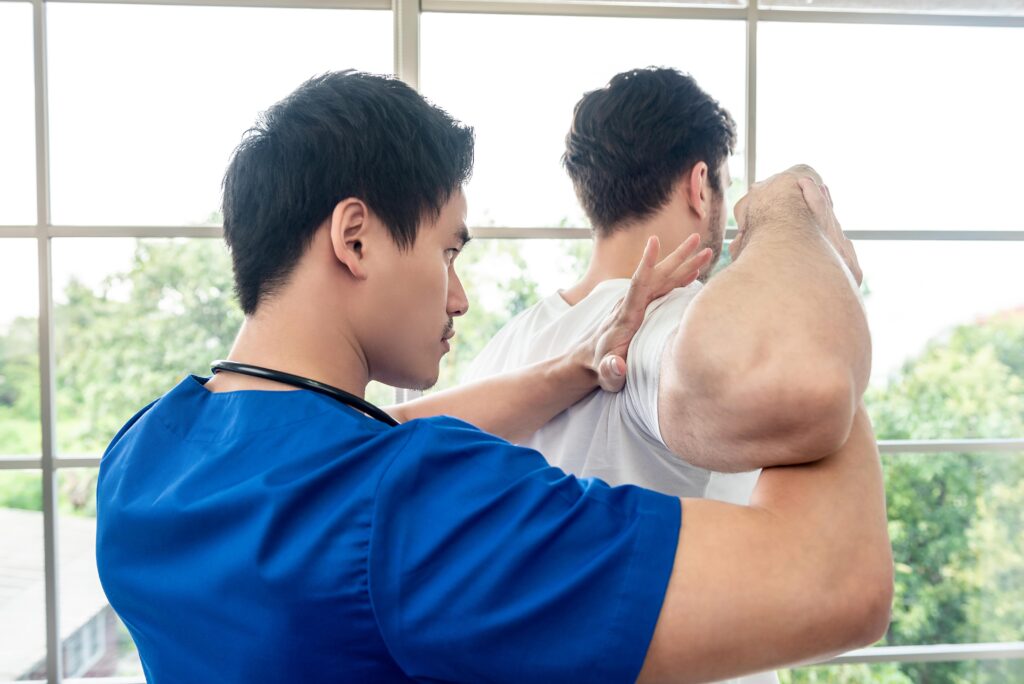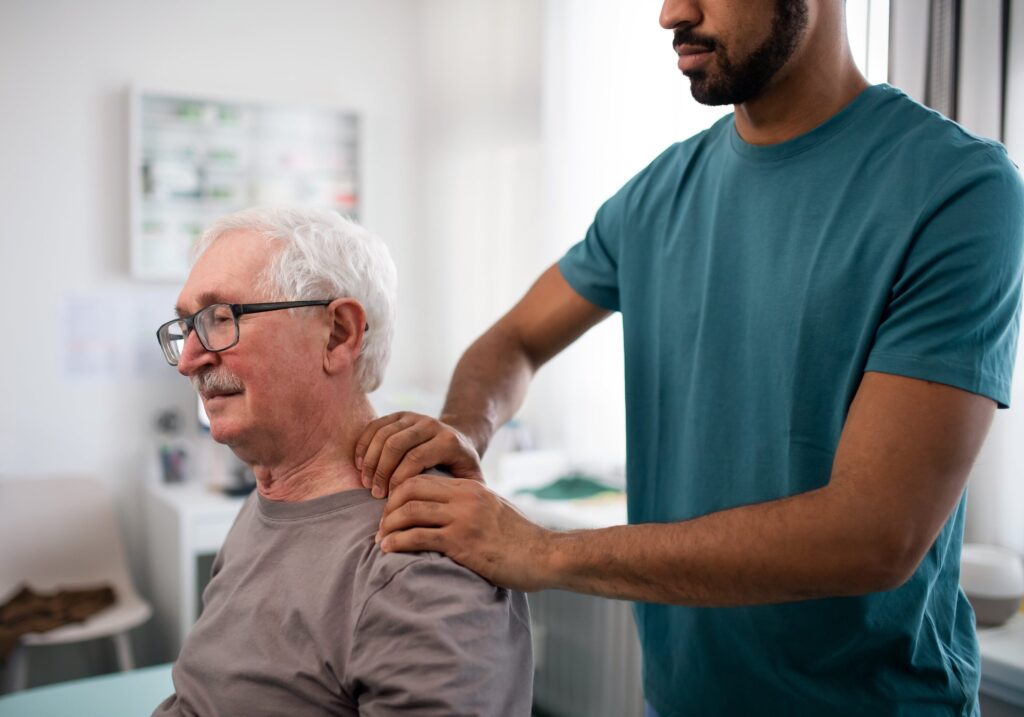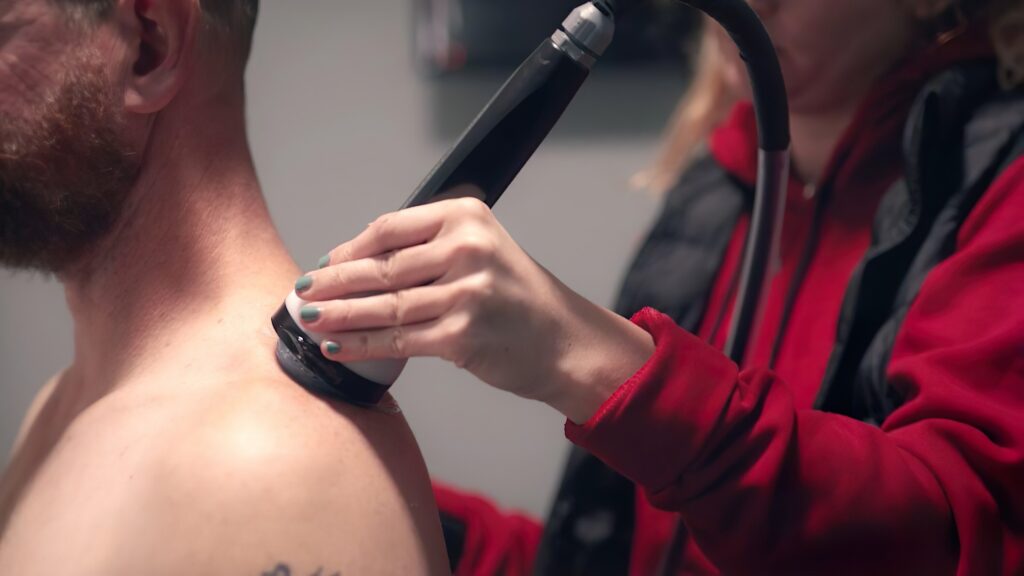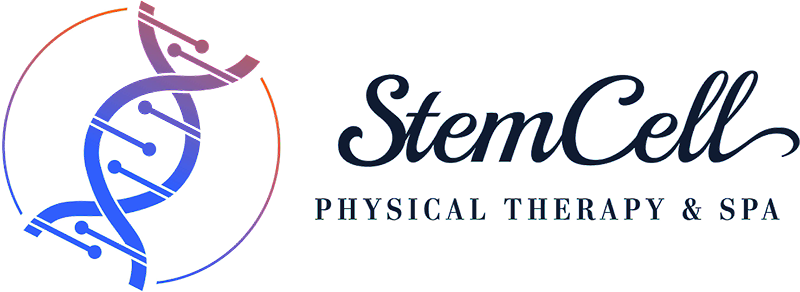Menu

Shoulder Pain Treatment
Shoulder pain is most often caused by rotator cuff tendonitis or bursitis. Other common conditions treated at Stem Cell Physical Therapy & Spa include rotator cuff tears, frozen shoulder, SLAP injuries, and acromioclavicular joint osteoarthritis. Our therapists utilize a combination of manual therapy and advanced technologies, such as STEMWAVE (True Extracorporeal Shockwave Therapy) – Stimulates healing and tissue regeneration, to provide effective conservative treatments for shoulder issues.
Recognizing early warning signs is crucial, as prolonged symptoms can interfere with everyday tasks at home and work. Shoulder pain is a common issue, often resulting from workplace strain, sports activities, and poor digital workplace ergonomics. Individuals involved in repetitive high-impact sports, such as tennis, are at greater risk of shoulder injuries due to overuse or overextension.
Recognizing early warning signs and distinguishing between minor discomfort that requires rest and symptoms of a more serious injury is crucial for developing an effective treatment plan to alleviate pain.

Common Shoulder Conditions
- Frozen Shoulder – Stiffness and pain in the shoulder joint, often limiting mobility.
- Rotator Cuff Injuries – Tears or inflammation of the rotator cuff muscles and tendons, leading to pain and weakness.
- Shoulder Bursitis – Inflammation of the bursa sac, causing discomfort and restricted movement.
- Shoulder Impingement – Compression of soft tissues in the shoulder, resulting in pain and reduced range of motion.
- Shoulder Labrum Tear – Damage to the cartilage surrounding the shoulder socket, affecting stability.
- Shoulder Tendinitis – Inflammation of the shoulder tendons, often due to repetitive movement or overuse.
- Shoulder Impingement vs. Shoulder Instability
- The key distinction between shoulder impingement and shoulder instability is that instability is a symptom, while impingement is a condition.
- Shoulder Impingement
- Shoulder impingement accounts for nearly half of all reported shoulder injuries and often results from conditions like bursitis or rotator cuff tendonitis. This condition occurs when the shoulder blade becomes misaligned and presses against the rotator cuff due to past injuries, leading to muscle and tendon swelling.
- This misalignment causes pain, particularly when lifting the arm above 90 degrees, such as during a tennis return or everyday activities like reaching for an item on a high shelf. Swelling further displaces the shoulder blade, increasing discomfort.
- Shoulder Instability
- Shoulder instability, on the other hand, refers to a looseness in the joint, making the shoulder feel as if it is slipping out of place. It can also cause frequent pain and discomfort.
- If you have been experiencing persistent shoulder pain for over two weeks, it is important to consult a therapist. A precise diagnosis can ensure proper treatment and management, as each condition presents distinct pain patterns.
Recovering full function after a shoulder injury can be challenging, as it often impacts various aspects of daily life. Our experienced therapy team specializes in musculoskeletal disorders and utilizes effective adjunctive treatments to enhance mobility and restore function.
The Role of Therapy in Shoulder Surgery Recovery
While surgery is sometimes necessary for certain shoulder conditions, many cases can be effectively managed with a combination of therapy and adjunctive treatments.
Why Is Therapy Important After Shoulder Surgery?
Therapy plays a crucial role both before and after surgery. Prehabilitation —engaging in strength and flexibility exercises before surgery—can lead to better post-operative outcomes, faster recovery, and minimized mobility loss. Unfortunately, many people overlook this step and focus solely on rehabilitation after surgery.
Following surgery, consulting a therapist is essential for a safe recovery and to prevent complications like frozen shoulder, which can develop due to prolonged immobility. Regular physical therapy and targeted exercises help maintain mobility and prevent stiffness.
Additionally, therapy accelerates muscle recovery and strength-building post-surgery, which is particularly important for athletes looking to return to their sport. Attempting to regain strength too quickly or returning to activity prematurely can increase the risk of re-injury, making structured therapy a key component of a successful recovery.
If you’ve been suffering from left or right shoulder pain for more than 2 weeks or experienced an acute shoulder injury, make an appointment with our therapy team to diagnose your condition properly. Pushing through the pain can exacerbate the issue. If you’re playing a sport with an aching shoulder, it’s best to schedule a physical therapy consultation to ensure that your injury is not something that lingers or worsens over time to require surgery.

STEMWAVE (True Extracorporeal Shockwave Therapy) for Rotator Cuff Tears
In rotator cuff tears, calcium deposits often accumulate on the tendons within the shoulder joint, leading to pain and restricted movement. STEMWAVE (True Extracorporeal Shockwave Therapy) is a noninvasive treatment that uses low-energy acoustic waves to penetrate deep into the affected area, breaking down calcifications and improving the functional range of motion. For some patients, this therapy can serve as an alternative to surgery.
Beyond breaking down calcium buildup, STEMWAVE (True Extracorporeal Shockwave Therapy)also promotes vascularization , enhancing oxygen and nutrient delivery to stimulate connective tissue healing. This results in improved function and effective shoulder pain relief.
Most clients can resume work, sports, and exercise immediately following treatment, making it a convenient and efficient option for recovery.
Fitness Package for Shoulder Recovery
Following an injury or surgery, a conditioning program helps restore strength and flexibility, reducing shoulder pain and promoting a quicker return to an active lifestyle. Even if your injury feels resolved, consulting a therapist is essential to strengthen the shoulder and prevent recurrence.
Enhancing shoulder stability through targeted muscle strengthening supports optimal function and reduces the risk of future injuries. Additionally, stretching exercises restore range of motion, keeping muscles elongated and flexible.
Shoulder conditions can greatly impact daily life, but seeking prompt treatment at Stem Cell Physical Therapy & Spa helps break the pain cycle and improve overall well-being.
Shoulder Pain Consultation
Recovering from a shoulder injury can be a challenging journey, as it often affects your ability to function and maintain independence. Shoulder injuries can significantly impact all areas of life, but with the right support, recovery is achievable.
At Stem Cell Physical Therapy & Spa, we provide comprehensive treatment plans designed to help you achieve your recovery goals. Our team works closely with orthopedic surgeons to develop individualized treatment plans tailored to your specific needs.
If you’re ready to take the next step in your recovery, contact us today to learn more about our services and how we can help you regain mobility, strength, and quality of life.
